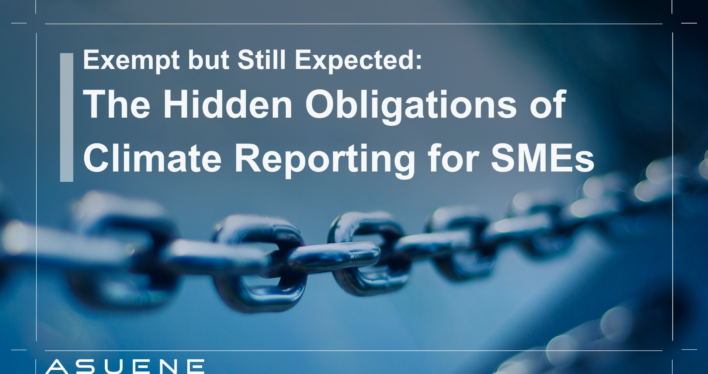- Article Summary
-
Introduction: The Illusion of Regulatory Relief
Governments around the world are simplifying climate regulations in an effort to ease administrative burdens on smaller firms. In October 2025, New Zealand raised the threshold for mandatory climate reporting under its Climate-Related Disclosures framework from NZ $60 million to NZ $1 billion, effectively removing many smaller and mid-sized enterprises from direct government reporting requirements. Earlier in the year, in February 2025, the European Commission proposed major simplifications to the Carbon Border Adjustment Mechanism (CBAM), followed by a political agreement in June 2025. The updated rules introduced a new 50-tonne de minimis threshold for importers, exempting around 90 percent of importing companies from CBAM reporting while still covering approximately 99 percent of emissions from in-scope goods.
At first glance, these reforms seem like relief for small and medium-sized enterprises (SMEs). Yet in reality, exemption from regulation does not equate to exemption from expectation. Buyers, investors, and financiers are continuing to demand accurate and verifiable emissions data across their value chains. For SMEs, this shift means the pressure to disclose climate data has not disappeared but has instead moved closer to the heart of commercial relationships. In the new landscape, climate reporting is no longer a compliance chore; it has become part of the basic infrastructure of doing business.
Supply Chain Pressure: When Buyer Expectations Outpace Regulation
Large corporations remain subject to disclosure rules through frameworks such as the EU CSRD, CBAM, or Japan’s GX-League. To meet these obligations, they are requiring detailed emissions information from their suppliers. Even if SMEs are no longer directly regulated, they now face a growing number of requests for carbon data, supplier questionnaires, and sustainability audits from their clients. The compliance responsibilities of large firms are cascading down the supply chain, reshaping procurement and supplier engagement across industries.
For small manufacturers and service providers, this often means preparing Scope 1, 2, and even 3 data to satisfy buyer requirements. Suppliers that cannot provide transparent and credible data risk losing contracts or being excluded from procurement programs. The shift is particularly significant in Asia-Pacific, where many exporters supply components or materials to multinational companies subject to European or Japanese regulations. In effect, climate reporting has become a contractual expectation that defines market access.
Climate Data as Business Infrastructure: Beyond Compliance
As disclosure expectations grow, climate and emissions data are taking on a new role within corporate operations. For SMEs, this information is no longer limited to sustainability reports but now influences financing, insurance, and risk assessments. Banks and investors increasingly request emissions data as part of credit evaluation. Buyers integrate sustainability metrics directly into procurement software. Insurers use climate-risk data to adjust premiums and coverage.
Without structured systems for measuring and managing emissions, companies face operational inefficiencies, higher capital costs, and reputational risks. By contrast, those that embed ESG and carbon accounting into their business systems can streamline reporting and strengthen their relationships with customers and partners. As ASUENE emphasizes, building a reliable ESG data pipeline is now as essential to competitiveness as maintaining financial or quality management systems.

Turning Obligation into Advantage: Why Transparency Pays Off
For forward-looking SMEs, the expansion of climate disclosure can be turned into an advantage. Transparent companies are often rewarded through better supplier rankings, preferred vendor status, and eligibility for sustainability-linked financing. The same systems that help meet buyer expectations also improve internal efficiency by revealing opportunities to reduce energy consumption and emissions.
Early adopters can use verified climate data to strengthen their brand and differentiate themselves from competitors who lag behind. This proactive stance positions them to respond quickly when clients or regulators update their requirements. Practical first steps include mapping emissions sources, setting measurable targets, using digital reporting platforms, and collaborating with buyers on standardized data formats. These investments build both resilience and credibility in an evolving global market.
Conclusion: From Exemption to Expectation
Regulatory simplification, as seen in New Zealand and the European Union, has reduced the direct compliance burden for smaller firms. Yet the demand for accurate, verifiable climate data continues to expand through financial institutions, procurement networks, and international supply chains. The new reality is that exemption from government reporting does not eliminate the responsibility to disclose.
For SMEs, climate reporting has become a default expectation of doing business. Integrating emissions management into everyday operations is now critical for maintaining market access and building long-term value. Companies that treat climate data as core infrastructure will find themselves better equipped to navigate the next phase of global sustainability transformation. ASUENE supports this transition by helping firms measure, manage, and share reliable climate data that meets the expectations of modern supply chains.
Why Work with ASUENE Inc.?
ASUENE is a key player in carbon accounting, offering a comprehensive platform that measures, reduces, and reports emissions. ASUENE serves over 10,000 clients worldwide, providing an all-in-one solution that integrates GHG accounting, ESG supply chain management, a Carbon Credit exchange platform, and third-party verification.
ASUENE supports companies in achieving net-zero goals through advanced technology, consulting services, and an extensive network.


